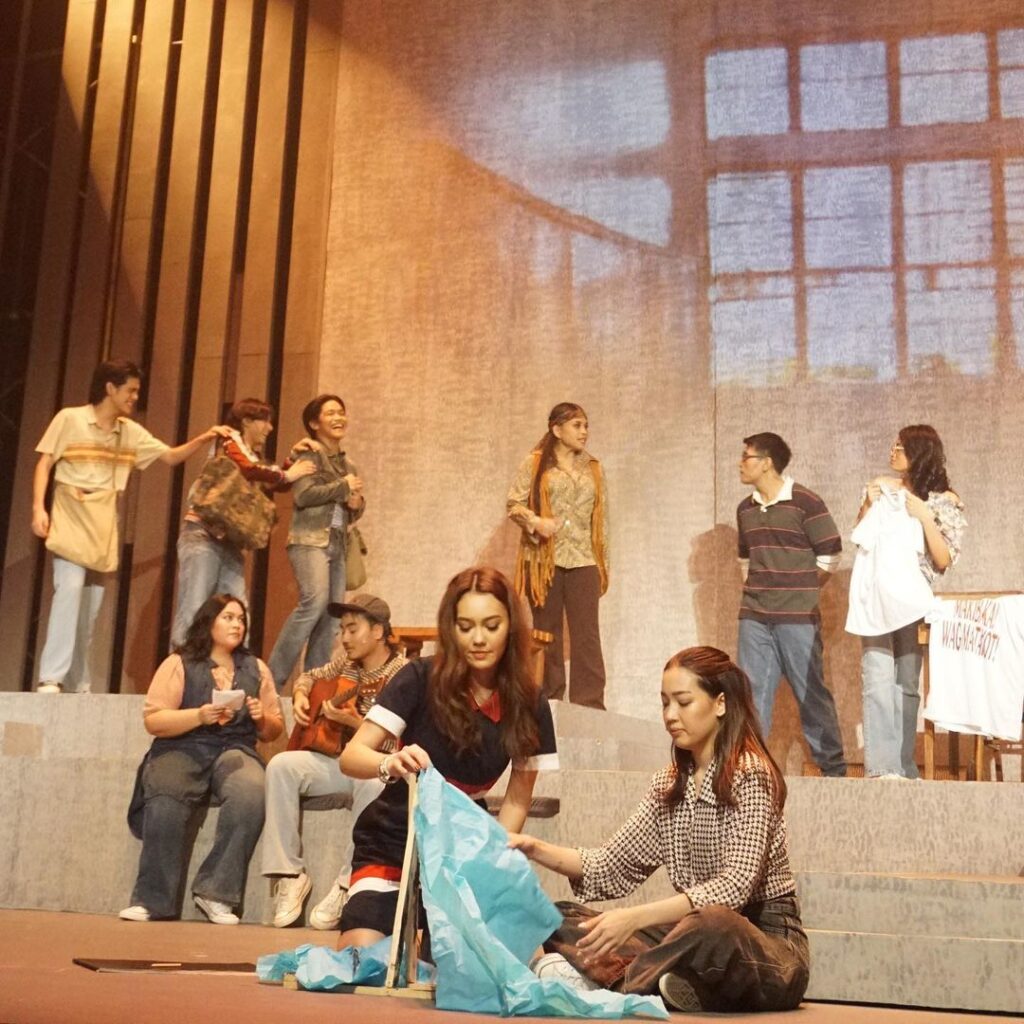The stage is rather simple in Silver Lining, a musical featuring all-original Filipino songs. Almost bare, except for a projection wall.
The musical, co-produced by Jack Teotico of Galerie Joaquin, relies on its dozens of actors and its dozens of topics threaded into its dozens of pleasant-enough Pinoy modern rock and pop music.
A musical within a musical, Silver Lining is split between two timelines: six decades ago and today.

The story begins in the present day, when a group of 60-something men (played by Ricky Davao, Joel Nuñez, Raul Montesa and Nenel Arcayan) decides to write a musical to bring back memories of their glorious heyday in the 1960s to 1970s.
Their wives and kids get involved, and the show unravels how the script and the production gradually come together — interspersed with the producers’ real-life drama.
Collective inspiration
It is hard to pinpoint exactly what Silver Lining is aiming for: Is it to truly entertain and inspire an audience? Or to merely use the stage as an outlet for years of collective musical inspiration among real-life friends experiencing nostalgia for their youth?
After all, at the musical’s presscon, it was revealed that the all-original Filipino musical was inspired by the life of Teotico, and the idea to create this musical happened during the pandemic.
But the central character’s life (played by Davao) is quite an ordinary one. Safe, and lacking in dramatic conflict.
Written by Palanca Award-winning playwright Joshua Lim So, with music and lyrics by Teotico and his Rockitwell band and directed by PETA’s Maribel Legarda, Silver Lining runs for two-and-a-half hours.

The title itself, Silver Lining, with the tagline “a new musical of hope and redemption”, reasonably plants expectations in the audience that they will go home with newfound hope and optimism.
But the silver lining, or the bright side, that break in the clouds, never seems to come. Instead, the entire experience feels like watching someone else’s typical privileged life in the ‘60s and ‘70s, and their children and grandchildren and their generic Gen-Z personalities.
There are far more interesting hippie stories that exist elsewhere. Effective storytelling could make the most mundane story profoundly affecting, but Silver Lining provokes neither thought or emotions — unless perhaps you are a friend or family of Teotico and company.
Silver Lining is crowded and self-indulgent, both with characters (the past and present and the generations of family and friends) and political and social issues.
Long list of themes
The musical touches on a startlingly long list of themes: reminiscing the past, the hippie era, lost friendships, mysterious disappearances, intergenerational gap, the stigma surrounding mental health, Martial Law, dictatorship and totalitarianism, familial conflict, historical revisionism, the Leni Robredo culture, the importance of finding the truth — and perhaps the more prominent: “the one that got away.”
When it comes to talking about Philippine history, particularly Martial Law, the musical becomes text-bookish, even spelling out the details of the declaration in lengthy texts on the projection wall. The musical forgets that its target audience is already aware that Martial Law happened — whether the boomer who experienced it or the millennial who learned about it in school.
Silver Lining also delved on the most recent presidential elections and the debates surrounding it, but it unabashedly megaphones from just one side of the fence and preaches to the audience as if it carried the absolute truth.

Comic relief comes from a couple of LGBT cast members who represent the TikTok era, but they feel more like accessories rather than human beings you can sympathize with.
In short, Silver Lining feels like a bland review of the past 60 years from the eyes of a single person. But you could give it credit for creating all-original Filipino music, with a couple of them LSS-inducing, including the Silver Lining song. But none of them would make you frantically head to Spotify once the songs are available.
The production boasts committed, enthusiastic performances from the entire cast, with standouts in Nuñez, Noel Comia Jr. (three-time Aliw Award winner and Broadway World Awardee for Best Actor) and Krystal Brimner.
Perhaps the silver lining in this musical is the testament to the musical abilities of the Filipino artist. Creating all-original Filipino music is indeed a feat. Truly, love for music is at the heart of this “barkada” project.
Silver Lining will have its final three-day run on 27-29 October at the Carlos P. Romulo Auditorium, RCBC Plaza in Makati City.
